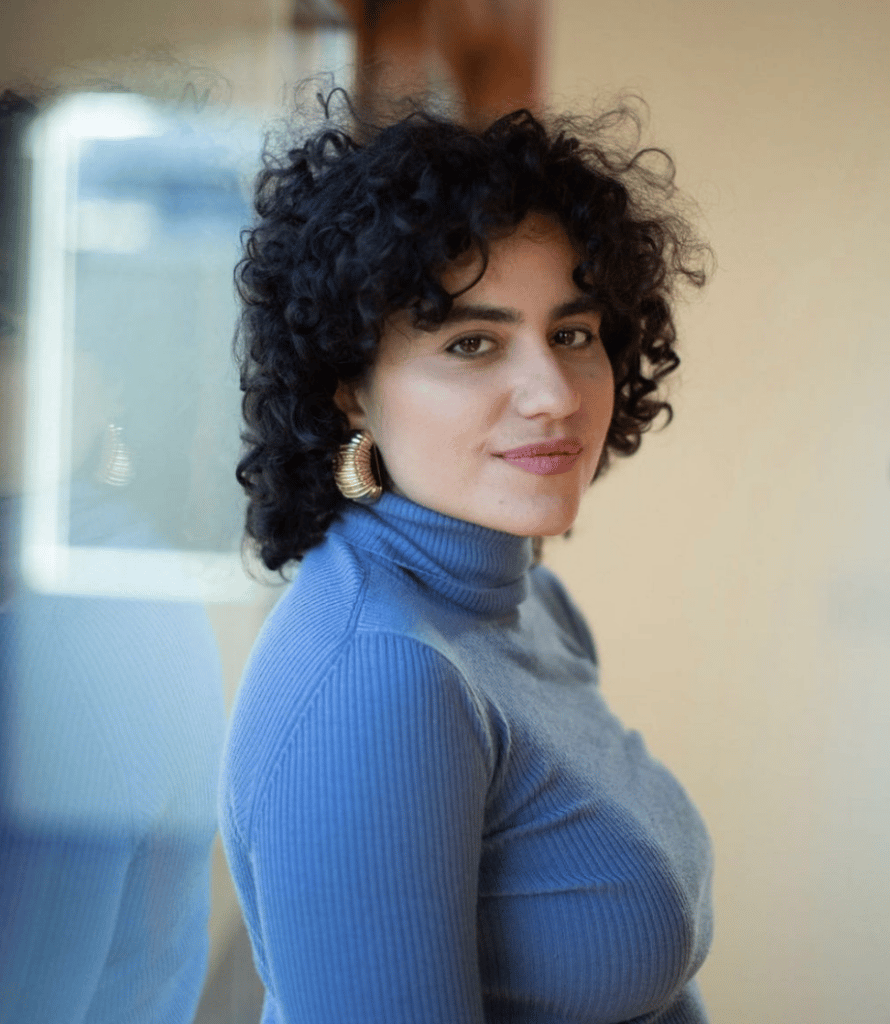
Jess Semaan is a multitalented force for liberation. (masmavi)
Six writers brought out a much bigger crowd than you might think for a chilly Thursday night on 24th Street. Though many poetry and literary events are titanic in an area with as rich a history for it as the San Francisco Bay Area, most shows are on the smaller side. Not so for Poets for Palestine, a rally of a kind hosted by anti-capitalist bookstore Medicine for Nightmares. Sam Sax spoke on the transient nature of the Jewish diaspora, Darius Simpson challenged the audience to think through definitions of terms such as imperialism and oppression.
Jess Semaan was one of the featured writers that night, and her work was both personal and political. The writer was born in Beirut, where many of her family members still live, and is no stranger to bombs and suppressive policy. In 2020 a massive explosion tore apart her home city, but these days it’s Israel striking home — as it has in the past — most recently killing four in southern Lebanon including two journalists and an 80-year-old woman on November 20. “My life has changed dramatically since October 7,” Semaan says. “I’ve lived through wars where Israel attacks our infrastructure, breaks international law, but this is still a shocking experience.”
Local Journalism for Working stiffs
We write for the poets, busboys, and bartenders. We cover workers, not ‘tech’, not the shiny ‘forbes 100 bullshit’. We write about the business on your corner and the beer in your hand. Join the Bay's best newsletter.
The psychotherapist and author grew up in Beirut, her family a Christian one with ties to Syria, Lebanon, and Palestine. Her Palestinian grandmother fled after what Semaan and many call the Nakba, the 1948 destruction of Palestinian homeland and attempted ethnic cleansing by Zionist forces. It’s worth noting the Nakba is mourned on the same day Israel celebrates its independence, both of which came about from the British-imposed Balfour Declaration. Semaan herself moved to the United States in 2010 and to the Bay Area for grad school at Stanford, finding places to build community at East Bay restaurants and bars such as Daytrip and Friends and Family.
That said, the writer says many of her non-Arab friends have played the “it’s complicated” card with her or are woefully ignorant about the region. In 2021 the Israeli Defense Force (IDF) struck media offices in Gaza, and she says that was just a taste of what she’s experiencing these days amongst colleagues and peers; She points out that Gaza is just a few hours away from Beirut. “When I’m back home there’s a consensus on reality,” Semaan says. “I realized here that this ignorance and these lies are what keeps the system going.”
At the same time Semaan finds the Bay Area’s commitment to demonstration inspiring. People she’s never met and who seem to have no personal tie to the Middle East are blocking the Bay Bridge, organizing fundraising, and reaching out to support. The social media reporting on the ground in Gaza, and the sharing of that content by people in the Bay, is a good thing in her mind. As soon as she heard what happened on October 7, she felt she knew precisely what Israel would do. She says that it’s about one Israeli killed for 70 to 100 Palestinians by the IDF, so the fallout of the October 7 Attacks is no surprise. “I knew there’d be mass killings,” Semaan says. “Any chance to grab land and kill as many Palestinians and Lebanese.”

Jess Semaan performing at Medicine for Nightmares. (Paolo Bicchieri)
She finds hope in organizations seeking liberation. The Arab Resource & Organizing Center (AROC) is a Bay Area-based project directing people and programming to agitate those in office and keep the community protected. Jewish Voice for Peace is another organization doing work she deems important, using their personal stories and histories to advocate for a peaceful solution. She and fellow Lebanese artist Halim Madi will perform their work at CounterPulse on December 7, too. Back home, the ships are not coming to Lebanon thanks to the war — she says her dad is running out of fuel. “It’s time to face the parts of us that are hardened, that are oppressive,” Semaan says. “When I’m walking down the street and I see an unhoused person, do I care? That’s dehumanization, too. This isn’t just about Palestinian oppression. It goes down to the personal.”
The post This Writer Rallying for Liberation Knows War All Too Well appeared first on Broke-Ass Stuart's Website.







